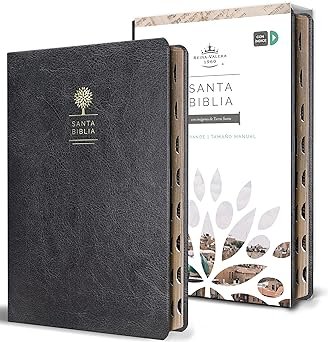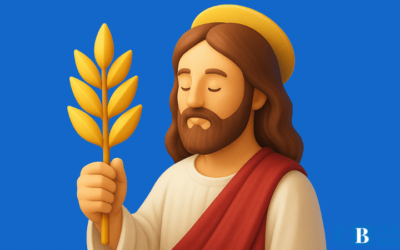What is it about the book of Psalms that has comforted hearts for over three thousand years?
Why have so many people, from kings to prisoners, found in his verses the exact words for what they feel?
The book of Psalms is not just ancient poetry.
It is a map of the human soul in dialogue with God, full of cry, praise, repentance and hope.
In this article you will discover what the real one is purpose of the Psalms in the Bible, how they impact the spiritual life of the believer, and why they remain as vital today as they were for David, Asaph, or Moses.
Prepare to rediscover this eternal treasure… and allow it to transform your relationship with God from the very depths.
Introduction to the Purpose of the Psalms
The book of Psalms is one of the most read, memorized, and quoted works in the entire Bible.
But beyond their poetic beauty, the Psalms fulfill profound spiritual functions that continue to impact believers today.
Next, we'll explore why its message is timeless and how it differs from other biblical texts.
Why are the Psalms still so relevant today?
The Psalms have not lost their validity.
On the contrary, its value has been maintained across generations and cultures.
1. They respond to real human emotions
They speak of joy, anguish, regret, gratitude, doubt and confidence.
Every human experience finds an echo in the Psalms.
2. They connect the believer's heart with God
The Psalms teach us to express our emotions with reverence, sincerity, and faith.
They are prayer guides in times of worship, pain or spiritual battle.
3. They strengthen faith in times of trial
Many believers turn to the Psalms in crisis because they offer comfort, direction, and hope based on God's Word.
4. They are devotional and liturgical tools
Whether in church, at home, or in private, the Psalms are used for reading, singing, praying, and reflecting.
What is a psalm and what distinguishes it from other biblical texts?
A psalm is a poetic composition written to express spiritual feelings toward God.
1. Poetic literature inspired by God
Unlike narrative or doctrinal books, the Psalms are sacred poetry.
They use parallels, images and emotions to convey divine truths.
2. Directed directly to God
While many biblical texts speak of God, the Psalms speak to God.
They are sung prayers, supplications, praises and declarations of trust.
3. Variety of styles and purposes
There are psalms of praise, lament, thanksgiving, teaching, imprecation, and proclamation.
Each one fulfills a specific spiritual function in the life of the believer.
4. They are interactive and personal
They invite the reader to respond, repeat, sing, and apply their message to their current situation.
Overview of the Book of Psalms in the Bible
With 150 chapters, the book of Psalms is the longest in the Scriptures.
It covers more than a thousand years of Israel's spiritual history and contains voices from several authors.
1. Structured in five internal books
The book is divided into five sections, symbolizing parallelism with the Pentateuch (the Torah).
Each section ends with a doxology (praise).
2. Diversity of inspired authors
David wrote most of them, but we also find psalms of Asaph, the sons of Korah, Moses, Solomon, and other anonymous authors.
3. A collection that spans generations
The Psalms were compiled over centuries and reflect varied contexts: from battles and kings to deserts and captivity.
4. A spiritual treasure for every believer
It is a book that can be read in its entirety or meditated upon verse by verse, and it always offers something new to the soul that seeks God.
Understanding the purpose of the Psalms is to rediscover how the Word can embrace the soul, direct the heart, and transform prayer.
It is opening the door to a sincere dialogue with God, using the same inspired words that thousands of generations before us have done.
Origin and structure of the book of Psalms
The Book of Psalms is not a work written in one go by a single author.
Its origin is diverse and its structure reflects centuries of history, worship and revelation.
Here I explain who wrote it, how it is organized, and what its use was among the people of Israel.
Who wrote the Psalms? (David, Asaph, Moses, etc.)
The Psalms were composed by various inspired authors over different generations.
1. David, the main psalmist
He composed at least 73 recorded psalms.
As a king, warrior, and musician, he expressed his worship, repentance, gratitude, and cry with unique transparency.
2. Asaph and the sons of Korah
Asaph was a worship leader appointed by David.
His descendants also wrote psalms, such as Psalm 73 and Psalm 84.
3. Moses and other authors
Psalm 90 was written by Moses, one of the oldest texts.
Psalms are also attributed to Solomon, Heman, Ethan and anonymous authors.
4. Inspiration over time
Although each author has his or her own style, all were guided by the Holy Spirit to build the faith of God's people.
Division into five books and its symbolic meaning
The book of Psalms is divided into five sections, which is no coincidence.
1. An intentional structure
The five books (Psalms 1–41, 42–72, 73–89, 90–106, 107–150) reflect a design that honors the Torah (the five books of Moses).
2. Endings with doxologies
Each section concludes with a doxology or expression of praise to God, marking the close of a thematic unit.
3. Varied content in each book
Although there are common themes, each section has distinct emphases: from personal worship to corporate outcry to the majesty of the Kingdom of God.
4. Symbol of spiritual fullness
The five books represent a complete guide to human expression and divine response.
The liturgical and communal use of the Psalms in Israel
The Psalms were more than poetry: they were living tools for worship and teaching.
1. Sung in the temple and in the synagogues
Many psalms were sung by Levites during sacrifices, festivals and solemn days.
2. Participation of the people
The community responded to certain lines in the form of a chorus, antiphon, or repetition, which strengthened spiritual unity.
3. Musical instruments
Harps, cymbals, trumpets and lyres accompanied the psalms, making them a complete form of worship.
4. Continuous liturgical heritage
To this day, many churches, both Protestant and Catholic, recite or sing psalms in their weekly liturgy.
Spiritual and emotional purpose of the Psalms
The Psalms not only teach theology; they also connect faith with human experience.
They show us how to bring every emotion to the altar of God and transform it into worship, trust, and transformation.
Expressing human emotions before God
The Psalms legitimize what we often don't know how to say to God.
1. Pain, joy, doubt, hope
There is no human emotion that is not reflected in a psalm.
From deep sadness to overflowing joy, everything can be presented before God.
2. Freedom with reverence
The psalmists express themselves with sincerity, without fear of being rejected, but always with reverence and faith.
3. God as an emotional refuge
The Psalms teach us that we can trust God not only with our decisions, but also with our emotions.
Inspiring confidence in the midst of affliction
Many Psalms were written in contexts of anguish, persecution or discouragement.
1. Promises that strengthen
Texts like “Even though I walk through the valley of the shadow of death…” (Psalm 23) or “I will lift up my eyes to the hills…” (Psalm 121) inspire faith in the midst of trials.
2. Real examples of spiritual struggle
The psalmists do not deny suffering, but face it with renewed confidence in God's faithful character.
3. Hope in the darkness
Even when there are no answers, the Psalms teach us to wait on God with active hope.
Motivate personal and communal worship
The Psalms constantly invite us to praise God, at all times and places.
1. Worship with soul and body
They teach us to sing, raise our hands, dance, cry out, and meditate on the greatness of God.
2. Call to all peoples
“Give thanks to the Lord, all you nations…” (Psalm 117) shows that worship is not just for Israel, but for all humanity.
3. Example of sincere worship
David dancing before the ark or crying out in the cave becomes a model for those seeking to worship authentically.
Model sincere and honest prayer
The Psalms teach us how to pray when we don't know what to say.
1. Personal prayers
Many psalms are cries of the soul alone with God, ideal for private prayer.
2. Community prayers
Other psalms are written in the plural, intended to be prayed in a group, as a nation or church.
3. Structure and language for the sentence
The Psalms offer vocabulary, forms, and examples to guide our own conversations with God.
When we understand that the Psalms were designed not only to be read, but to be lived, our relationship with God is transformed.
They teach us to feel with God, think with God, and speak to God… from the depths of our soul.
Types of Psalms and their functions
The book of Psalms is neither uniform nor repetitive.
Its spiritual richness comes largely from the variety of genres it contains, each with a specific purpose.
Below, I explain the main types of Psalms and how they impact our spiritual lives.
Psalms of praise
These psalms exalt God for who He is and for His mighty works.
1. Focus on divine greatness
They celebrate attributes such as faithfulness, justice, mercy, and the creative power of God.
Example: Psalm 145 – “I will exalt you, my God, my King.”
2. Poetic and exalted language
They use images such as mountains, seas, thunder and stars to describe divine majesty.
3. Spiritual function
They invite the soul to rise above circumstances and fix its eyes on the glorious character of God.
They are ideal for starting times of prayer and worship.
Psalms of Lament
These psalms express pain, anguish, loss or internal conflict.
1. Crying out in times of affliction
The psalmist pours out his heart in situations of personal or national suffering.
Example: Psalm 13 – “How long, Lord, will you forget me forever?”
2. Include honest complaints
They are not irreverent, but deeply real.
They model how to take distress directly to the throne of God.
3. Spiritual function
They teach us that we are not alone in our pain and that we can express our emotions transparently before God.
Psalms of Thanksgiving
These psalms acknowledge God's intervention at specific moments and give glory for his faithfulness.
1. Gratitude after the trial
They are written as a public testimony of divine help.
Example: Psalm 30 – “I will exalt you, Lord, for you have lifted me up.”
2. Focused on what God has done
They detail specific situations of liberation, healing, provision or forgiveness.
3. Spiritual function
They foster an attitude of gratitude, renewed faith, and continued recognition of God's grace.
Royal or Messianic Psalms
These psalms celebrate the reign of God or of the king of Israel, and in many cases point directly to the Messiah.
1. They proclaim divine government
They show God as sovereign King over the nations and over creation.
2. They portray the Messiah prophetically
They point to Christ as the Anointed One, eternal King, suffering servant or son of God.
Example: Psalm 2 – “You are my Son, today I have begotten you.”
3. Spiritual function
They affirm Christ's authority over our lives, strengthen eschatological hope, and faith in God's eternal plan.
Psalms of wisdom
These psalms teach principles for living righteously and fearing God.
1. Contrast between the righteous and the wicked
They propose opposite paths and their respective consequences.
Example: Psalm 1 – “Blessed is the man who does not walk in the counsel of the ungodly…”
2. Didactic and reflective tone
They invite us to meditate on the law, observe the ways of man, and choose the path of wisdom.
3. Spiritual function
To guide the believer toward righteous decisions, reverent fear, and growth in godly character.
Imprecatory Psalms
These psalms contain strong pleas for justice and judgment against the enemies of God.
1. Harsh and confrontational language
They ask God to act against the wicked, oppressors or traitors.
Example: Psalm 109 – “Let his descendants be destroyed…”
2. Focus on divine justice
They are not born of personal hatred, but of the desire to see God's name vindicated and the innocent protected.
3. Spiritual function
We are taught to leave vengeance in God's hands and to cry out for justice without taking it upon ourselves.
Each type of Psalm fulfills a specific function in the spiritual life:
Some lift us up, others confront us, some teach us, and all bring us closer to the heart of God.
The variety of genres reflects the depth of our human experience… and the breadth of the divine love that sustains it.
The use of the Psalms in devotional life
The Psalms have been used for centuries as a manual for prayer, meditation, and deep spiritual connection with God.
Their honest, poetic, and Father-directed language make them powerful tools for daily devotional growth.
Here I explain how to integrate them into your personal time with God.
How to pray the Psalms daily
The Psalms are not just meant to be read: they are meant to be prayed, recited, and lived.
1. Personalize the text
Read the psalm aloud, and where the text speaks in general terms, replace it with your own words, circumstances, and names.
Example: “The Lord is my pastor…”, make it yours.
2. Use the Psalms as a structured guide
You can follow a daily reading plan, praying a different psalm each day.
Many believers pray one psalm in the morning and another at night.
3. Let the psalm shape your spiritual language
If you don't know how to express what you feel, let the psalm speak for you.
The Word of God is already written to guide your own prayer.
Using the Psalms to Strengthen Faith in Difficult Times
In times of distress, anxiety, or loss, the Psalms are like a beacon in the storm.
1. Find appropriate psalms for each situation
- For anxiety: Psalm 27, Psalm 46
- For sadness: Psalm 42, Psalm 13
- For fear: Psalm 23, Psalm 91
2. Read them aloud, several times a day
Repetition allows the truth to penetrate beyond the mind, all the way to the heart.
Many psalms were sung precisely for this reason.
3. Declare them as an affirmation of faith
Even if your heart does not feel confident, declare what the Psalms proclaim:
“The Lord is my light and my salvation; whom shall I fear?”
Biblical meditation based on key verses
The Psalms invite us to meditate, not just read.
Biblical meditation allows you to absorb each word as spiritual nourishment.
1. Choose a short verse per day
For example, “Be still, and know that I am God” (Psalm 46:10).
Read, repeat, memorize and reflect on it throughout the day.
2. Ask yourself
What does this verse reveal about God?
What does it reveal about me?
How do I apply it today?
3. Write your thoughts in a journal
A line or two can help you record what the Holy Spirit shows you through meditation.
The Psalms and the Character of God
One of the greatest treasures of the Psalms is how they reveal to us who God is.
In the midst of suffering or joy, the psalmists describe God with powerful metaphors that strengthen faith and broaden our spiritual vision.
God as refuge, shield and eternal rock
The Psalms teach us that God is an impenetrable fortress for those who trust in Him.
1. Shelter from the storm
God is presented as a safe place where the soul can rest.
Example: “You are my refuge; you will keep me from trouble” (Psalm 32:7).
2. Protective shield
Enemies have no real power when God is the one who covers us.
Psalm 3:3 – “But you, Lord, are a shield around me.”
3. Eternal and immovable rock
The image of God as a rock speaks of stability, security, and permanence.
In an unstable world, He remains steadfast.
God as King, Judge and Shepherd
The God of the Psalms is not distant: he is sovereign, just, and close.
1. King of all the earth
The psalmists declare that God rules over the nations and establishes his throne with justice.
Example: Psalm 47:7 – “God is King of all the earth.”
2. Just judge and defender of the oppressed
God is not indifferent to sin or injustice.
Judge with equity and defend those who cry out for help (Psalm 9:8, 10:17-18).
3. Pastor who guides and provides
Psalm 23 shows God as the tender Shepherd who guides along paths of justice, cares for and restores the soul.
One of the most beloved images in the Bible.
God's faithfulness and mercy in the Psalms
These two qualities appear repeatedly and are the spiritual anchor of the psalmist.
1. Unwavering loyalty
God keeps his promises.
Although man fails, God remains faithful.
Example: Psalm 89:1 – “I will sing of the Lord’s lovingkindness forever.”
2. Mercy that renews every day
Divine compassion is inexhaustible.
The Psalms show that God delights in forgiveness and restoration.
3. Security that springs from divine character
The psalmist does not trust in circumstances, but in the faithfulness and mercy of a God who never changes.
Knowing God through the Psalms is not just a devotional exercise, but an inner transformation.
This is where faith becomes solid, the heart aligns with heaven, and daily life is filled with eternal purpose.
The purpose of the Psalms in spiritual formation
The Psalms were not only written to be read, but to form the spiritual character of the believer.
Its poetic and deeply theological content serves as a tool for cultivating maturity, intimacy with God, and a healthy, truth-centered emotionality.
Strengthen the life of prayer
One of the key purposes of the Psalms is to teach us to pray with depth, honesty, and reverence.
1. They give language to the soul
The Psalms express prayers when our words run out.
They teach us to pray in the midst of joy, sorrow, doubt, or faith.
2. They teach spiritual structure
Many psalms follow a pattern: cry, declaration of faith, petition, and praise.
This model can enrich our own personal prayer.
3. They encourage constant prayer
Daily use of the Psalms in prayer keeps the mind focused on God and helps develop spiritual discipline.
Modeling an intimate relationship with God
The psalmists did not know God only by concept, but by experience.
And that is what his words reflect.
1. Prayers from the depths
David and other authors related to God as Father, King, Refuge and Shepherd.
The closeness is felt in every line.
2. Relationship built on trust
The Psalms model how to trust God even when circumstances are confusing or painful.
3. Inspiration for a real devotional life
Instead of empty religious relationships, the Psalms show us how to walk with God in authenticity.
Forming an emotionally healthy biblical worldview
Mature spirituality does not ignore emotions, but aligns them with truth.
1. They validate every human emotion
The Psalms do not repress crying, anger, loneliness, or joy.
They channel them correctly before God.
2. They root emotion in truth
Although feelings vary, the Psalms teach us to stand firm in who God is and what he has said.
3. They stimulate rational and emotional worship
Man was created to love God with all his heart, soul and mind.
The Psalms help us integrate all these dimensions.
The Psalms in Jewish and Christian liturgy
The use of the Psalms in liturgical contexts is not a modern practice.
Since ancient times, they have been at the heart of the collective worship of God's people.
Here I explain how they were used and how they continue to be part of today's liturgy.
Its use in the Temple, synagogues and the early church
Communal worship in the people of Israel revolved largely around the Psalms.
1. Sung in the Temple of Jerusalem
The Levites sang psalms daily during the sacrifices.
Example: Psalms 113–118 were sung during Passover.
2. Recited in synagogues
After the exile, the Psalms became central reading in Sabbath services.
3. Adopted by the early church
The early Christians, many of them Jews, continued to pray and sing psalms.
Paul recommends “psalms, hymns, and spiritual songs” (Ephesians 5:19).
Recitation and singing in worship contexts
Music and liturgy are naturally intertwined in the Psalms.
1. Recited as collective prayers
Even today, many churches recite psalms antiphonally or responsorily, strengthening the spiritual unity of the body.
2. Sung as part of praise
Psalms have been set to music for centuries, from Gregorian chants to contemporary praise songs.
3. They perform a formative function
Repeating psalms in community shapes the faith, spiritual memory, and focus of the congregation.
The Psalms in the Anglican Prayer Book and Catholic Liturgy
Two historical traditions have preserved the systematic use of the Psalms in their daily worship.
1. Liturgy of the Hours (Catholic)
The Catholic Church recites the 150 psalms in daily and weekly cycles.
They form the basis of monastic and priestly prayer.
2. Book of Common Prayer (Anglican)
Includes a daily reading calendar of the Psalms.
Allows the entire church to pray the psalms collectively throughout the month.
3. Common inheritance
In both the Evangelical, Catholic and Orthodox traditions, the Psalms remain a unifying point in the worship of God.
The Psalms not only nourish the believer personally, but they unite the community of faith in a common voice.
Its liturgical use throughout the centuries is a testament to its power, depth, and ability to bring us to the very center of God's presence.
References to the Psalms in the New Testament
The New Testament is deeply rooted in the Old Testament, and within it, The Book of Psalms is the most cited source.
Jesus and the apostles used the Psalms to teach, pray, announce prophetic fulfillment, and explain the work of the Messiah.
Exploring these connections allows us to see how the Holy Spirit inspired perfect harmony between the two covenants.
Quotes from the Psalms by Jesus and the Apostles
The Psalms were not only known to Jesus and the disciples, but were an active part of their spiritual and doctrinal language.
1. Jesus recited them as prayer and teaching
- On the cross, he said, “My God, my God, why have you forsaken me?” (Psalm 22:1).
- In his teaching, he used Psalm 110:1 – “The Lord said to my Lord…” to speak of his divinity (Matthew 22:44).
2. Peter and Paul preached with the Psalms
- At Pentecost, Peter quoted Psalms 16 and 110 to explain Christ’s resurrection and exaltation (Acts 2:25–36).
- Paul quotes Psalm 32 to speak about justification by faith (Romans 4:6–8).
3. The Psalms as prophetic authority
The NT authors used the Psalms as a basis to validate the identity and work of the promised Messiah.
The Psalms as messianic prophecy fulfilled in Christ
Many psalms contain direct or typological prophecies of the Messiah, which are fulfilled exactly in the life of Jesus.
1. Psalm 2
It announces a King enthroned by God, declared as His Son.
Accomplished in baptism, transfiguration, and resurrection.
2. Psalm 110
Describes the Messiah as an eternal priest and victorious king.
Jesus himself quotes it to teach that Christ is greater than David.
3. Psalm 118
It contains the phrase: “The stone which the builders rejected…” (v. 22), applied to Jesus as the rejected and glorified foundation.
4. Psalm 69
It describes the suffering of the righteous; John 19:29 mentions its fulfillment with vinegar on the cross.
5. Spiritual function
These psalms strengthen the believer's faith by showing that God anticipated and planned every detail of the plan of redemption.
Psalm 22 and the crucifixion of Jesus
This psalm is one of the most striking, because it describes in detail what happened on the cross… a thousand years earlier.
1. Start with the words Jesus spoke on the cross
“My God, my God, why have you forsaken me?” (Psalm 22:1).
2. Describe the physical and emotional suffering of the Messiah
- “They pierced my hands and my feet.”
- “They divided my clothes among themselves.”
Both phrases were literally fulfilled during the crucifixion.
3. End with hope and victory
The same psalm that begins with a cry ends with a declaration of universal worship.
Jesus quoted the first line to point out the complete fulfillment of the psalm.
4. Spiritual function
Psalm 22 not only predicts the cross: it helps us understand the heart of the Messiah in his suffering and surrender.
Recommended books on the Psalms (Amazon)
To deepen your understanding, application, and spiritual richness of the Psalms, here are three essential books.
They are available on Amazon and have been recognized by believers, pastors, and scholars around the world.
“The Psalms: Poetry and Prayer” – Dietrich Bonhoeffer
A classic of Christian spirituality written by the German theologian who was martyred for his faith.
This book:
- Teaches how to pray the Psalms from Jesus' perspective.
- It shows how human suffering finds an echo in the Word.
- It is ideal for believers who wish to mature spiritually in times of trial.
“The Message of the Psalms” – Eugene H. Peterson
Author of “The Bible in Modern Language” (The Message), Peterson offers a pastoral and accessible interpretation.
- It helps to understand the structure and emotion behind each psalm.
- Perfect for small group leaders, preachers, or personal devotionals.
- It brings the Psalms to life in the language of the modern soul.
“Commentary on the Book of Psalms” – Charles Spurgeon
A monumental work by one of the most influential preachers in history.
- Includes theological explanations, practical applications, and devotional reflections.
- He breaks down each verse with doctrinal depth and pastoral passion.
- Ideal for preachers, Bible teachers, and Christians who want a complete study.
These books will not only help you understand the Psalms.
They will take you to live them, pray them, and trust more deeply in the God who inspired every word.
For Christian entrepreneurs who want to impact with purpose
Entrepreneurship with faith is more than building a business: it is obeying a calling that glorifies God through work, creativity, and excellence.
If your vision is based on eternal values, this section was designed with you in mind.
Here are three tools designed to help you grow without compromising your principles.
🚀 NippyLaunch.com – Launch your project with a Christian identity
NippyLaunch is not just a website platform.
It is a space designed for Christian entrepreneurs to launch their ideas with purpose and professionalism.
1. Create your website, online store, or SaaS without relying on secular services
2. Includes templates, premium plugins, and personalized technical support
3. Ideal for churches, ministries, faith-based businesses, and digital Bible education
With NippyLaunch, your business reflects Kingdom values from the first click.
📈 CleefCompany.com – Marketing with truth and purpose
You don't need to cheat to grow.
At CleefCompany, we help you attract customers with digital campaigns that honor God.
1. Advertising on Facebook Ads and Google Ads with ethical and effective segmentation
2. Analysis of results with complete transparency
3. Free 30-day trial plan to demonstrate real results
Forget empty marketing.
Here, the strategy is based on integrity, excellence, and results with eternal meaning.
🧮 CalculatorCCH.com – Wise decisions, solid business
As a good steward of the Kingdom, you need tools to help you manage wisely.
CalculatorCCH.com offers over 600 completely free calculators to help you with every decision.
1. Calculators for pricing, budgeting, margins, ROI, and productivity
2. Tools also for health, well-being and personal balance
3. No intrusive ads or mandatory registrations
All created for Christian entrepreneurs who want to grow their impact with biblical order and direction.
Cultural and emotional impact of the Psalms throughout history
Over the centuries, the Psalms have transcended their original context to become a source of inspiration, comfort, and transformation in multiple cultural expressions.
His influence goes beyond the church: he has touched music, art, literature, and humanity's darkest moments.
The Psalms in classical, modern and contemporary music
From psalms sung by Levites to symphonic concerts, his music has transcended generations.
1. Classical works
Composers such as Handel, Bach and Vivaldi set psalms to music in masterpieces such as The Messiah (Psalm 2) and Magnificat.
2. Hymns and congregational songs
Many traditional hymns are based directly on psalms, such as “The Lord is My Shepherd” (Psalm 23).
3. Contemporary Christian music
Many current worship songs use verbatim verses or direct inspirations from the book of Psalms.
Inspiration for poets, artists and reformers
The Psalms have been a muse for authors, reformers, and thinkers who have sought to express their faith in words and artistic forms.
1. Martin Luther
He used the Psalms as the basis for his reformed hymns.
Psalm 46 inspired “A mighty fortress is our God.”
2. Christian writers and poets
George Herbert, John Donne and CS Lewis cited them constantly in their works.
3. Visual artistic expression
From medieval stained glass to Renaissance paintings, the Psalms have been illustrated as portraits of faith.
The Psalms as consolation in wars, pandemics and persecution
When the world trembles, the Psalms remain as a safe refuge.
1. During wars
Soldiers and families in conflicts such as World War II prayed Psalm 91 for divine protection.
2. In pandemics
During the Black Death, Psalm 46 was recited in public processions and community prayers.
During COVID-19, Psalm 23 went viral on social media as a cry of faith.
3. In religious persecution
Believers in concentration camps, prisons, and oppressive regimes have found strength in phrases like “Even though I walk through the valley of the shadow of death…”
The Psalms are not relics of the past.
They continue to resonate powerfully in hearts, nations, and at defining moments in history.
Where there is pain, doubt, or glory... there the Psalms continue to be the living voice of the soul that seeks God.
How to teach the Psalms in groups or churches
The book of Psalms is not just for personal use.
It is also a powerful source of teaching for Christian communities, small groups, cells and Sunday schools.
When taught with intention, the Psalms awaken a vibrant and authentic faith in all kinds of believers.
Ideas for thematic series of Psalms for Bible studies
Teaching the Psalms thematically allows you to connect with the emotions and needs of the group.
1. Series: “God is my Refuge”
Explore Psalms such as 46, 91, 27, and 121 to strengthen confidence in times of trial.
2. Series: “Psalms that heal the soul”
Focus on psalms of lament and restoration such as 6, 13, 42, and 51.
Ideal for groups facing grief, crisis, or spiritual exhaustion.
3. Series: “Praise at all times”
Based on worship psalms such as 100, 103, 145 and 150.
Teaches how to praise in joy, pain, and routine.
4. Series: “Christ in the Psalms”
Messianic Psalms such as 2, 22, 110, and 118 help us see Jesus in the Old Testament.
Psalms as a tool for biblical counseling
Many pastors, leaders, and counselors use the Psalms to minister to those experiencing emotional or spiritual difficulties.
1. Identify the appropriate psalm
- For anxiety: Psalm 94:19, Psalm 56
- For guilt: Psalm 51
- For confusion: Psalm 25
- For loneliness: Psalm 62
2. Read aloud together
This allows the person to hear spiritual truth with authority and compassion.
3. Pray with that psalm
Transforming the text into prayer guides the heart to align with biblical truth.
Activities for young people and adults based on the Psalms
The Psalms can be lived, not just taught.
Here are some practical ideas to apply in groups:
1. Creative journal with psalms
Participants choose a psalm each week and express it through drawing, poetry, collage, or reflective writing.
2. Antiphonal reading
Divide the group into two sections and read psalms responsively as was done in the temple.
3. Memorization challenges
Create weekly challenges with symbolic prizes for memorizing key verses.
4. “My Psalm Today”
Each participant chooses a psalm that reflects their emotional state and explains why they chose it.
Recommendations for memorizing and applying the Psalms
The Psalms are designed to be remembered and used in daily life.
Memorizing them is not only a discipline, but a way to engrave the truth in the heart.
Creative methods for memorizing verses
Beyond repetition, there are dynamic and effective ways to memorize the Psalms.
1. Visual cards
Write the verses on cards decorated with colors, icons, or drawings that reinforce the content.
2. Songs or rhythms
Create a simple melody or use existing songs to memorize psalms like Psalm 23 or Psalm 121.
3. Daily handwriting
Copying a psalm repeatedly throughout the week helps you memorize it visually and motorically.
4. Verse per day
Reciting a verse each morning upon waking and before going to bed strengthens retention.
How to apply a specific Psalm to a personal situation
The Psalms are as current as the situations we face today.
1. Identify your need or emotional state
Are you grateful? Disappointed? Worried? There's a psalm for every moment.
2. Find a psalm with a similar theme
For example, if you feel fear, Psalm 27:1 will remind you that God is your light and salvation.
3. Personalize the psalm as a prayer
Change “he” to “you” or add your name.
Example: “Lord, you are my rock. Today I trust in you even though I feel weak…”
4. Take action inspired by the psalm
If the psalm speaks of forgiveness, decide to forgive.
If he speaks of praise, he sings.
Connect the Word with your reality.
Devotional journal using the Psalms
One of the most effective ways to internalize the Psalms is to write down what God speaks to you through them.
1. Choose a psalm per day or per week
Read the entire psalm aloud at least twice.
2. Write the following in your journal
- Which verse spoke to you the most?
- What does this psalm reveal about God?
- What does it reveal about you?
- What can you pray or do today based on this psalm?
3. End with a written prayer
This will help you build a more intimate and constant relationship with the Lord.
Memorizing, applying, and teaching the Psalms transforms not only your mind, but also your spirit.
They are daily nourishment, emotional shield and safe guide.
A life filled with Psalms is a deeper, more balanced, and more God-centered life.
Frequently Asked Questions About the Purpose of the Psalms
What is the main purpose of the book of Psalms?
The central purpose of the Psalms is to express the relationship between human beings and God in all its dimensions: worship, cry, gratitude, trust, pain, faith, and hope.
They serve as a guide for prayer, worship, and meditation, helping the believer connect emotionally and spiritually with the Creator.
What differentiates the Psalms from other biblical books?
Unlike narrative, doctrinal or prophetic books, the Psalms are poetic and prayerful texts.
They do not tell stories or establish laws, but rather reflect the human soul in direct dialogue with God.
They are unique for their emotional honesty and deep devotion.
Can I use the Psalms to pray today?
Yes, absolutely.
The Psalms were written to be prayed, sung, and recited.
You can use them as is, adapt them to your personal situation, or use them as a basis for your own words.
They are an excellent tool to enrich your devotional life.
Which Psalms are most commonly used in times of crisis?
Some of the most frequently used Psalms in difficult times include:
- Psalm 23: God as Shepherd and Guide in the Darkness.
- Psalm 46: Refuge in the midst of adversity.
- Psalm 91: Divine protection and security.
- Psalm 121: Trust in the Lord's help.
- Psalm 34: Praise in the midst of grief.
Why are there so many psalms of lament?
Because they reflect human reality.
Suffering, injustice, fear and regret are part of the believer's experience.
The psalms of lament teach us that it is valid to express sorrow before God, and they guide us to transform that sorrow into trust.
Are there prophecies about Christ in the Psalms?
Yeah.
Several psalms contain messianic prophecies that are fulfilled in Jesus, such as Psalm 2, Psalm 22, Psalm 110, and Psalm 118.
These texts announce his rejection, suffering, kingship, and victory, and are cited in the New Testament as evidence that Jesus is the promised Messiah.
How do I start studying the Psalms on my own?
You can start by reading a psalm a day, praying with it, and writing down what God speaks to you.
You can also study by topic (praise, trust, repentance) or follow a chronological reading plan.
Using a good Bible commentary or study Bible will further enrich your understanding.
Are the Psalms only for personal use or also for communal use?
Both.
Many psalms were written to be sung and recited in assemblies, festivities and liturgies.
At the same time, they are deeply personal.
You can use them in your daily devotional or in worship meetings, Bible studies, sermons, and church activities.
Conclusion
The Psalms are not just inspirational poetry.
They are a bridge between the human heart and the heart of God.
In them we find words when we have none, comfort when our souls ache, and guidance when everything seems uncertain.
Each psalm has a purpose: to shape your spirit, shape your prayer, and remind you that you are not alone in your walk with God.
Through generations, the Psalms have accompanied believers in their battles, victories, and deserts.
And today, they remain as alive as when they were written, ready to speak to you… if you are willing to listen.
Which psalm has had the greatest impact on your life?
I invite you to share it in the comments and tell us why this psalm is special to you.
Your testimony can be a balm for someone else.
Discover How the Bible Can Transform Your Life
- Bible Study – explore the teachings of the Bible and find answers to life’s challenges.
- Fundamental Beliefs – delves into the principles that have guided millions through the centuries.
- Spiritual Growth – Strengthen your faith with studies designed to bring you closer to God.

Discover How the Bible Can Transform Your Life
- Bible Study – explore the teachings of the Bible and find answers to life’s challenges.
- Fundamental Beliefs – delves into the principles that have guided millions through the centuries.
- Spiritual Growth – Strengthen your faith with studies designed to bring you closer to God.



























0 Comments